Beginner’s Guide to Medicare
- January 26, 2018
- Posted by: cody_crumes
- Category: Insurance

Medicare coverage can be confusing. When choosing to enroll in Medicare, it is important to consider all of the options available to you so that you can choose the plan that will be the right fit for your specific needs.
History of Medicare
On July 30, 1965, President Lyndon B. Johnson signed into law the bill that led to the establishment of Medicare and Medicaid. The original Medicare program included Part A (Hospital Insurance) and Part B (Medical Insurance). Today these two parts are called “Original Medicare.” Over the years, Congress has made many changes to Medicare:
More people have become eligible. For example, in 1972, Medicare was expanded to cover the disabled, people with end-stage renal disease (ESRD) requiring dialysis or kidney transplant, and people 65 or older that select Medicare coverage.
More benefits, like prescription drug coverage, have been offered.
What does Medicare Cover?
Each Medicare program provides different coverage. Plus, there are optional and supplemental plans that can provide additional coverage.
Medicare Part A is essentially hospital coverage. It helps pay for inpatient care provided at a hospital, skilled nursing facility or hospice.
Medicare Part B is your doctor and medical coverage. It helps pay for outpatient care and doctor’s services. This includes doctor visits, preventative care, x-rays, lab tests and specialists.
Medicare Part A and Medicare Part B are collectively known as Original Medicare.
Medicare Advantage (also known as Medicare part C) is another option for Medicare coverage. Medicare Advantage provides the same benefits as part A and part B, but you get the benefits through a private insurance company. This insurance would be through a PPO, HMO or a private fee for service plan.
Medicare Part D is an optional prescription drug benefit.
Medicare Supplemental plans, also known as Medigap plans, provide additional coverage. They fill in the “gaps” between Medicare Part A and Medicare Part B. Currently, there are 11 Medigap plans available (with policy names A through N).
What is the best option for me?
The best option for you depends on your personal situation – your current health, your medical history and your budget. At Crumes Insurance, we offer solutions in all of these categories. Contact us today for a personal consultation – we will discuss your specific needs to come up with the best solution for you.
